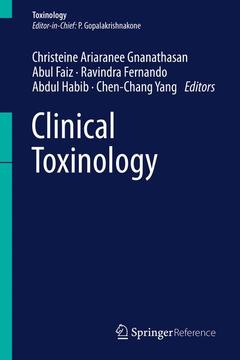Description
Clinical Toxinology in Asia Pacific and Africa, 2015
Clinical Toxinology
Toxinology Series
Language: English
Subjects for Clinical Toxinology in Asia Pacific and Africa:
Keywords
Publication date: 10-2014
Publication date: 03-2015
636 p. · 15.5x23.5 cm · Hardback
Description
/li>Contents
/li>Biography
/li>Comment
/li>
Clinical toxinologic conditions are becoming increasingly frequent, more so than is generally recognized. The conditions comprise of clinical aspects such as the diagnosis, management, and prevention of snakebite envenoming, scorpion sting, mushroom toxins, plant toxins, and other natural toxins. Clinical toxinology also deals with the ecology, epidemiology, regional differences, and varieties of fauna accounting for different envenoming manifestations.
This handbook includes 30 chapters addressing various topics on clinical toxinology such as the epidemiology and management of snakebites in different Asian and African countries, disability following snakebite, effect of snake venoms on hemostasis, socioeconomic aspects of snakebites, therapeutic application of snake venom, scorpion sting in the Middle East, jelly?sh sting, etc. These titles are written by experts currently working in the subspecialty, many of whom have ?rst-hand experience in the relevant research ?elds. In virtually all the topics, appropriate illustrations are provided to simplify comprehension including tables, ?gures and pictures.
This reference work on Clinical Toxinology in Asia Paci?c and Africa, in the Toxinology handbook series, is designed to keep readers abreast with new knowledge and experience in toxinology regionally and globally. Toxinologists, researchers, scientists, and experts in this ?eld from various working areas considered it necessary to collect all the aspects of clinical toxinology in a single, handy handbook. This can be used by medical students, postgraduate students, general practitioners, specialists in internal medicine, critical care physicians, emergency physicians, and anesthetists worldwide.
Animal Toxin Envenomation in South Cone of America.- Antisera.- Bees and Wasp Envenomation.- Centipede Venom I.- Centipede Venom II.- Clinical Uses of Snake Antivenoms.- Complications of Hematotoxic Snake Bites in India.- Developing Snake Antivenom Sera by Genetic Immnization: A Review.- Disability and Impairment Following Snakebite in Africa.- Diversity and Distribution of the Medically Important Snakes of India.- Envenomations by Exotic Snakes and Other Venomous Pets.- Envenomations, Snakes, Jelly Fish.- Epidemiology of Snake Envenomation in Taiwan.- Food Poisoning in Bangladesh.- Haematoxic Snake Bites in India.- Historical Review (of Snake Venom).- Management of Snake Envenomation in Taiwan.- Mushroom Poisoning.- Natural Toxin .- Envenomation in Bali.- Natural Toxin Envenomation in Papua New Guinea.- Natural Toxin.- Envenomation in Taiwan.- Natural Toxin Envenomation in Vietnam.- Pathophysiology and Treatment of Envenomation by European Vipers.- Plants Poisoning: Bangladesh Perspective.- Poisoning Related to Anticholinergic Plants and Herbs in Taiwan.- Poisonings and Natural Toxins in New Zealand.- Poisonous Mushrooms.- Puffer Fish Poisoning: Bangladesh Perspective.- Kidney Injury and Animal Toxins.- Review on Natural Toxin Envenomation in Peru.- Scorpion Envenomation.- Snake Envenomation in Panama.- Snake Bite Envenoming in Latin America and the Caribbean.- Snake Bites in Columbia.- Snake Bites in Tamil Nadu.- Snake Envenomation and Treatment in India.- Snake Envenomation in Bangladesh.- Snake Venom Detection Kit (SVDK): Update on Current Challenges.- Snake Venoms and Scorpion Venom Research in the Middle East: A Review.- Snakebite in the Pediatric Population.- Socioeconomic Aspects of Snakebite in Africa and Tropics.-Spectrum of Presentation and Treatment of Neurotoxic Snakebite.- Tetrodotoxin Poisonings in Taiwan.- Venomous Snakes and Envenomation in Brunei.- Venomous Snakes and Snakebite in India.- Venomous Snakes and Envenomation in Nepal.- Venomous Snakes and Envenomation in Senegal.- Venomous Snakes and Snake Envenomation in Nigeria.- Venomous Snakes of Pakistan.- Venomous Snakes of Peninsula Malaysia and Borneo.- Viper Venom and Hemostasis.
Prof P. Gopalakrishnakone is a world leader in the characterization of the structure and function of animal and plant toxins and chemical poisons, which contain highly specific and biologically active components. He has contributed significantly to the body of knowledge regarding the anatomy of snake venom glands and the development of drug candidates from animal toxins. Prof Gopal pioneered the development of the NUS Venom and Toxin Research Programme, which has put NUS at the forefront of toxin research internationally. The technology platform that has been built over the years under the Venom and Toxin Research Programme, coupled with its extensive library of protein and peptides, has enabled Prof Gopal and his team to complete the discovery process of lead candidates in time and to transfer valuable supplementary information to the next discovery steps involving profiling and optimization of lead candidates. The objective is to characterize the venom components and natural toxins at a molecular level and identify promising compounds amenable to the development of novel human therapeutics. Prof Gopal’s lab has identified over twenty peptides with unique medical indications from venom-based proteins with some already under development as therapeutics. His research studies includes structure function studies (toxin detection, biosensors, antitoxins and neutralization factors), toxicogenomics and expression studies, antimicrobial peptides from venoms and toxins and PLA2 inhibitors as potential drug candidate for inflammatory diseases. The techniques he employs include quantum dots to toxinology, computational biology, microarrays and protein chips. He has patented analgesic peptide, anti inflammatory peptide as well as anti rheumatoid arthritis peptides. He is exploring various possibilities of delivery systems for these peptides to target sites and administration of these peptides orally, transdermally, ocular and injections.Prof Gopal has over 100 internationa
These books may interest you

Scorpion Venoms 488.00 €



